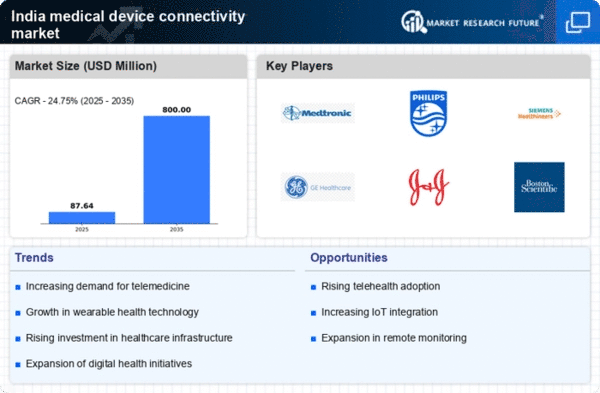Surge in Health Data Analytics
The rise of health data analytics is significantly impacting the medical device-connectivity market in India. With the proliferation of connected medical devices, vast amounts of health data are generated, necessitating advanced analytics to derive actionable insights. Healthcare providers are increasingly leveraging data analytics to improve decision-making, enhance patient outcomes, and optimize operational efficiency. The integration of analytics into connected devices allows for predictive modeling and personalized treatment plans. As the demand for data-driven healthcare solutions grows, the medical device-connectivity market is expected to benefit from this trend, fostering innovation and enhancing service delivery.
Increased Focus on Patient-Centric Care
The shift towards patient-centric care is driving transformation within the medical device-connectivity market in India. Healthcare providers are increasingly prioritizing patient engagement and satisfaction, leading to the adoption of connected devices that empower patients to take control of their health. Devices that facilitate self-monitoring and provide personalized health insights are gaining traction. This trend aligns with the broader movement towards value-based care, where outcomes are prioritized over volume. As healthcare systems evolve to meet these demands, the medical device-connectivity market is likely to expand, reflecting the growing emphasis on patient-centric solutions.
Government Initiatives for Digital Health
Government initiatives aimed at promoting digital health are playing a pivotal role in shaping the medical device-connectivity market in India. Programs such as the National Digital Health Mission (NDHM) are designed to enhance healthcare delivery through technology. By fostering an ecosystem that supports the integration of connected medical devices, these initiatives are likely to stimulate market growth. The Indian government has allocated substantial funding to improve healthcare infrastructure, which includes investments in digital health technologies. This supportive regulatory environment may encourage innovation and attract investments in the medical device-connectivity market.
Rising Demand for Remote Patient Monitoring
The medical device-connectivity market in India is experiencing a notable surge in demand for remote patient monitoring solutions. This trend is driven by an increasing prevalence of chronic diseases, which necessitates continuous health monitoring. According to recent estimates, the chronic disease burden in India is projected to rise, with conditions such as diabetes and cardiovascular diseases affecting millions. Remote monitoring devices enable healthcare providers to track patient health metrics in real-time, thereby improving patient outcomes and reducing hospital visits. The convenience and efficiency offered by these devices are likely to enhance their adoption, contributing to the growth of the medical device-connectivity market.
Advancements in Wireless Communication Technologies
The evolution of wireless communication technologies is significantly influencing the medical device-connectivity market in India. Innovations such as 5G and advanced Wi-Fi standards are facilitating seamless connectivity between medical devices and healthcare systems. These technologies enable faster data transmission and improved reliability, which are crucial for applications like telemedicine and real-time health monitoring. As healthcare providers increasingly adopt connected devices, the demand for robust wireless communication solutions is expected to rise. This trend may lead to enhanced interoperability among devices, ultimately driving the growth of the medical device-connectivity market.
















